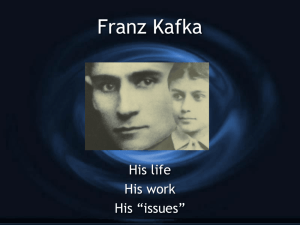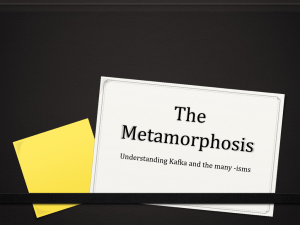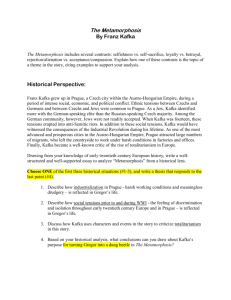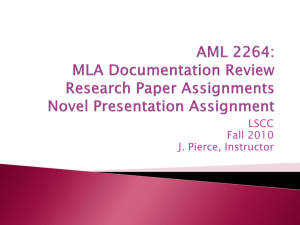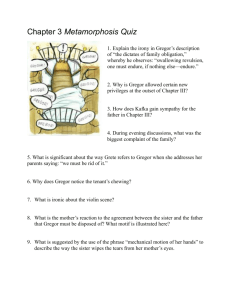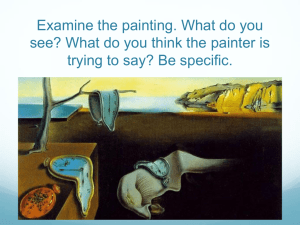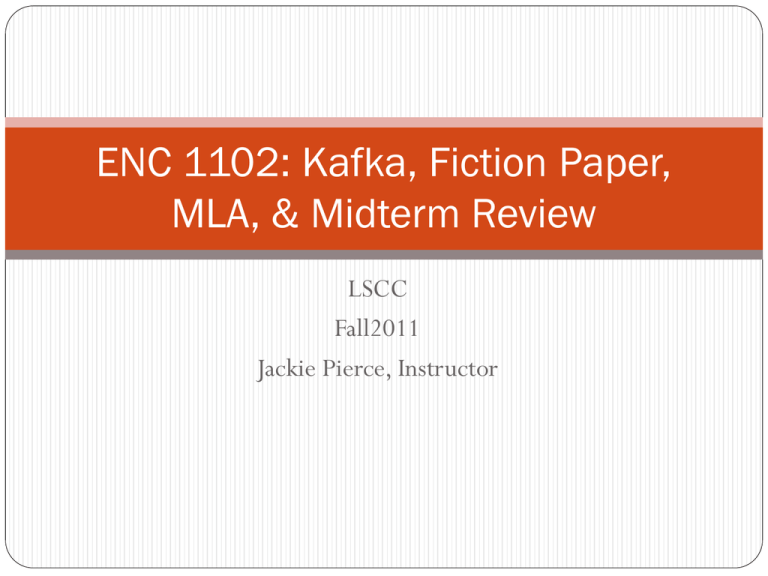
ENC 1102: Kafka, Fiction Paper,
MLA, & Midterm Review
LSCC
Fall2011
Jackie Pierce, Instructor
Agenda
Franz Kafka’s The Metamorphosis
Fiction Paper
Assignment
Conducting Research
Documenting sources
Midterm Review
Coming Attractions
Franz Kafka: Life
1883-1924, middle class Jewish family in Prague
Older brother to three sisters; always conscious of role
in family
Parents not all that impressed with writing career
Father privileged financial success
Mother devoted to husband and children
Held tedious office jobs and wrote at night
Longed to forge family of his own and escape parents,
but mostly failed at relationships
Died of tuberculosis
http://search.eb.com.db14.linccweb.org/eb/article-9044295
Franz Kafka: Work
Unsure of ability
Published some during lifetime, but asked that unpublished
work be destroyed as he neared death
Literary agent and friend refused to do so
Matter of fact telling of fantasy
Much attention to the struggle of the individual
Known for expressing alienation of modern man
http://search.eb.com.db14.linccweb.org/eb/article-9044295
Franz Kafka: Interpretation
“Allegories of divine grace”
Existentialists: “guilt and despair as the ground upon which
to construct an authentic existence.“
“Neurotic involvement with his father”
“Social criticism [of] the inhumanity of the powerful and their
agents, the violence and barbarity that lurk beneath normal
routine.”
Critique of “totalitarianism [and] faceless bureaucratic terror”
“Surrealists delighted in the persistent intrusions of the
absurd.”
“One critic may have put it most accurately when he wrote
of the works as ‘open parables’ whose final meanings can
never be rounded off.”
http://search.eb.com.db14.linccweb.org/eb/article-9044295
Basics Summary
Plot
Conflict(s)
Clmax(es)
Point of View
Effect of third person?
Level of omniscience?
Setting
Apartment
How do you picture the
city?
Symbols & Themes?
More detail to follow
Characters
Gregor
Greta
Mr. Samsa
Mrs. Samsa
Head clerk
Cook
Maid
Cleaning woman
Borders
In-Depth Team Discussion
Each team will be given a discussion question
You will have time to discuss and prepare an answer
As part of this answer, be sure to note specific page &
paragraph numbers for relevant passages
Share question & findings with class when finished
Team Questions
1.
2.
3.
Discuss Gregor’s acceptance of
circumstances and the adaptations
and excuses he makes for himself
and others in the story.
Focus on Grete. Trace her
reactions to Gregor throughout
the story. Pay special attention to
the fact that she is the one to
finally declare they must get rid of
Gregor.
Focus on the family finances.
How does each person view
work? How do their work lives
change after the metamorphosis?
Discuss and react to how
each member of the
household reacts to
Gregor’s death and to the
family behaves at the end of
the story?
5. Characterize Mr. and Mrs.
Samsa. Trace their prior
dependence on Gregor,
their initial and changing
reactions to him after the
change, and their reactions
to their own changes in
circumstances throughout
the story.
4.
Links
Excellent site with summaries, quizzes, sample essays, etc.
An online fun quiz to help you determine which character you
are.
Information on a graphic novel adaptation of the text.
Kafka’s Metamorphosis in stop-motion
Fiction Paper Assignment
The Mission: to write a 5 page
research paper analyzing one or
more short stories from our class’
selection.
Requirements:
Minimum of five full pages (not
counting the Works Cited page, of
course)
At least 2 reputable secondary
sources plus the primary source(s)
MLA documentation
Category
Worth
On Time
10
Effective
Intro/Conclusion/Thesis
10
Thoughtful & Coherent Analysis
20
Adequate Proof from Primary
Source
10
Use & Choice of Secondary
Sources
10
MLA Format & Documentation
20
Grammar & Punctuation
20
Total
100
Talk About Topics
A character study
Trace a particular motif/theme
Adopt a critical lens and apply it to a limited aspect of the
story
Compare & contrast two stories
Characters
Treatment of a similar theme
Point of view
Other aspect
Research Reminders
For books
Author’s Last Name & “Criticism” as a Subject search
Databases
Two literary databases with many articles on both our books
Unlike books, you can target more if overwhelmed by looking through
Book’s title rather than author
Even try area of interest “Walker and Color Purple and sexuality” for example
Exploring other databases
Encyclopedia Databases for reference information
Many great articles available on JSTOR
MLA: Works Cited
Do your works cited list as you locate resources
Start with the stories themselves
Helpful tools
A handbook such as The Little Brown Compact Handbook
Any library will also have the actual MLA Handbook
DO NOT rely on Word 2007
Sites like www.easybib.com
The Basics
Author
Title of work
Title of source
Editors for anthologies
Page numbers for parts like articles, etc.
Dates of publication
Dates of access for electronic sources
Database names, owners, and location of access
URLs
The Look
Still plain double-space
Just like the rest of the paper
Part of the same document
Header with page # continues on this last page
Works Cited
Centered at the top of the page
The entries are alphabetized
Entries use the “hanging indent”
Reverse of paragraph indent
Citing from an Anthology
This includes our textbook.
Author. Title. Source. Edition. Editors. City: Publisher,
Year. Page range. Format.
For example:
Mason, Bobbie Ann. “Shiloh.” Literature: An Introduction to
Fiction, Poetry, Drama andWriting. 10th ed. Eds. X.J. Kennedy
and Dana Gioia. New York: Pearson Longman, 2007. 604-612.
Print.
The benefit of using an essay collection is that you might find
multiple sources in one book!
Book Sources
Book with an overall author:
Author. Title. City: Publisher,Year. Print.
Book that collects essays:
Author of essay. “Title of Essay.” Title of Collection. Editor(s).
City: Publisher,Year. Page range of essay. Print.
Reference books—actual Encyclopedia:
“Article.” Encyclopedia Title. Edition. Year. Print.
Articles from Databases
Samples abound on the library’s website
Here’s a sample from both of the Literary Databases you’re
targeting:
Sackton, Alexander H. "A Note on Keats and Chaucer." Modern
Language Quarterly 13 (1952): 37-41. Literary Reference Center. 16
Sept. 2010. Web.
Wood, Michael. "Tolkien's Fictions." New Society 27 Mar. 1969.
Literary Resources from Gale. 30 May 2010. Web.
Web Sources
Web sources require:
Author. “Title.” Webpage Title. Publisher, Date published. Date
Accessed. Web.
The only time you’ll need the URL at the end now is if it’s “hard
to find.”
You really should not be using web sources for your
secondary material.
Citing Inside the Paper
Overtly introduce/mention your sources
In “Sunday in the Park,” by Bel Kaufman, we meet Morton, a
“city pale” university professor…
According to Barbara Christian, Alice Walker’s use of….
End cited material with a parenthetical citation
What goes inside? (Author #)
If no author: (“Title” #)
If author previously mentioned, just (#)
If electronic and no actual page number available (par. #)—this
is new to MLA this year
The Mention-Citation Sandwich
It is NOT ok to just have a citation at the end of a
paragraph
Implies that only the last sentence came from the source
Often, you will include a paragraph full of information from the
same source
By starting with a mention and ending with a citation,
you make it clear everything from point a to point b
came from that same source
o Examples….
The Mention-Citation Sandwich
o John Doe’s early childhood is
still somewhat of a mystery to
scholars. Nobody really knows
much about his school days. We
know he attended school for at
least part of his childhood. “Doe
was apparently not a good
student. School records indicate
he was suspended three times in
one semester” (Appleton 376).
o John Doe’s early childhood is
still somewhat of a mystery to
scholars. Adam Appleton’s
book, Doe’s Early Days, offers a
little insight into this man of
mystery. We know he
attended school for at least
part of his childhood.
Appleton asserts, “Doe was
apparently not a good student.
School records indicate he was
suspended three times in one
semester” (376).
What was wrong with…
o John Doe’s early childhood is still somewhat of a mystery
to scholars. Nobody really knows much about his school
days. We know he attended school for at least part of his
childhood. “Doe was apparently not a good student.
School records indicate he was suspended three times in
one semester” (Appleton 376).
Note how it could be just the quote, any part or the whole paragraph that
comes from Appleton’s book
Also, note how the quote isn’t attached to any other phrase or sentence:
DON’T DO THIS! Integrate quotes with at least an opening phrase.
Quoting & Paraphrasing
When writing about literature, you’ll quote more from your
primary sources and paraphrase more from your secondary
sources
Even then, you don’t want lots of long quotations
Make sure to format quotes properly
In-text vs. Indented
Integrate and follow up on quotes
What’s Next
Put together your thoughts on novel and what aspects you
wish to cover
Pick passages from the novel that illustrate your points
Research your stories to supplement your discussion
In some cases the research won’t cover what you’re talking about
In those cases, you can include some biographical, historical, or
other background with the research
For example, say I wanted to argue that the narrator in “The Yellow
Wallpaper” suffers from post-partum depression. I could research postpartum using psychological sources and then tie to the story myself.
The Terms from Fiction
Antagonist
Modernism
Romanticism
Character
Motivation
Round characters
Climax
Narrator
Setting
Conflict
Naturalism
Stream of
Dénouement
Omniscient narrator
Exposition
Plot
Falling action
Point of view
Fiction
Protagonist
Flat characters
Realism
Consciousness
Symbol
Theme
Unreliable or Naïve
Narrator
Foreshadow
Resolution
Limited omniscience Rising action
The Tales
William Faulkner, “A Rose for Emily”
Includes point of view discussion from the chapter
Edgar Allen Poe, “The Tell-Tale Heart”
Includes point of view discussion from the chapter
Kate Chopin, “The Story of an Hour
Jhumpa Lahiri, “The Interpreter of Maladies”
Ernest Hemingway, “Cat in the Rain”
Bel Kaufman, “Sunday in the Park”
Charlotte Perkins Gilman, “The Yellow Wallpaper”
Including accompanying readings
Flannery O’Connor, “A Good Man is Hard to Find”
Including accompanying readings
Alice Walker, “Everyday Use”
Including accompanying readings
Franz Kafka’s The Metamorphosis
Coming Attractions
10/3Midterm exam, reading
poetry w/handout poems
"Icarus" and "The Terrorist,
7 10/5 He Watches"
10/10
8 10/12 Poetry and Voice
10/17
9 10/19 Closed Form Poetry
FICTION PAPER DUE
10/5
1, 2, 4
Ch. 14 (645-73)
2
Ch. 22 (809-29)
2

